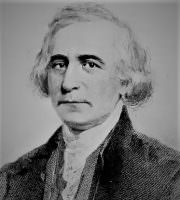About Philip Freneau
Philip Freneau, born January 2, 1752 in New York and died December 18, 1832 in Matawan, New Jersey, was an American poet, nationalist and polemicist. He studied at the College of New Jersey (which became Princeton University in 1896) where he became close friends with James Madison, the future President of the United States, a friendship that would later prompt him to found his newspaper, the National Gazette. He published his first collection of poetry 'A Poem, on the Rising Glory of America' in 1772, followed by 'The American Village, a Poem' published by S. Insley & A. Carr, New York, in 1772. His third book of poetry The British Prison-Ship: A Poem, will be published nine years later by Francis Bailey, in 1781. His most famous works include The Confession of General Cage (1775) and The House of the Night (1779). During the American independence movement, his patriotic poems earned him the reputation of the Poet of the American Revolution. If Freneau's political works received the most attention during his lifetime, some nature and funerary poems such as The Wild Honey Suckle, To a Caty-Did and The Indian Burying Ground are now considered his most important contribution to American literary history; they point beyond contemporary neoclassicism and make Freneau appear as a forerunner of American Romanticism.He was the first writer to have given voice to American sentiments in a rather original way. Lover of primitive life and the figure of the 'Good Savage' of which he saw the incarnation in the Indians of America, Freneau dealt extensively with the themes of the sea and nature and although he wanted to consider it a pre-romantic, he remained anchored to the Enlightenment and neoclassicism for a taste for satire and a certain moralism.
In the last years of his life he assumed eccentric attitudes and behaviors and received many criticisms, such as that of liar and antiquated. In political articles, essays and occasional poems, he commented on the small and large political issues of the republic, spoke out against slavery and for more women's rights and thus distinguished himself as an egalitarian publicist who was often radically ostracized by his opponents. American literature had to wait for Walt Whitman to rediscover it and fully reassess it. The romantic trait of his character was what drove him to sea adventures and to the search for unusual sensations and remote landscapes. It was precisely from this that the soft and fresh vein of his poems arose. In The Power of Fancy (1770) he was influenced by Milton and Goldsmith and transmitted a sensitivity and an ideality that made Keats foreboding. In The House of Night (1775), the strange musicality of verse and the description of nocturnal landscapes suggest Coleridge and Poe. Freneau sang the 'Fragile' beauty of the northern marshes, managing to express a language of images already almost freed from European and Anglo-Saxon influence.
Browse all poems and texts published on Philip Freneau









